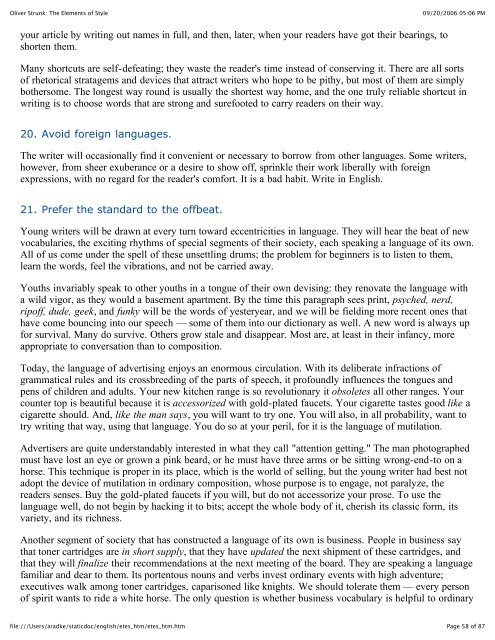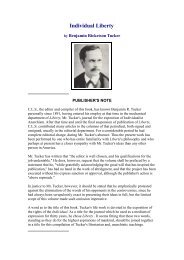Oliver Strunk: The Elements of Style - Evernote
Oliver Strunk: The Elements of Style - Evernote
Oliver Strunk: The Elements of Style - Evernote
You also want an ePaper? Increase the reach of your titles
YUMPU automatically turns print PDFs into web optimized ePapers that Google loves.
<strong>Oliver</strong> <strong>Strunk</strong>: <strong>The</strong> <strong>Elements</strong> <strong>of</strong> <strong>Style</strong><br />
your article by writing out names in full, and then, later, when your readers have got their bearings, to<br />
shorten them.<br />
file:///Users/aradke/staticdoc/english/etes_htm/etes_htm.htm<br />
09/20/2006 05:06 PM<br />
Many shortcuts are self-defeating; they waste the reader's time instead <strong>of</strong> conserving it. <strong>The</strong>re are all sorts<br />
<strong>of</strong> rhetorical stratagems and devices that attract writers who hope to be pithy, but most <strong>of</strong> them are simply<br />
bothersome. <strong>The</strong> longest way round is usually the shortest way home, and the one truly reliable shortcut in<br />
writing is to choose words that are strong and surefooted to carry readers on their way.<br />
20. Avoid foreign languages.<br />
<strong>The</strong> writer will occasionally find it convenient or necessary to borrow from other languages. Some writers,<br />
however, from sheer exuberance or a desire to show <strong>of</strong>f, sprinkle their work liberally with foreign<br />
expressions, with no regard for the reader's comfort. It is a bad habit. Write in English.<br />
21. Prefer the standard to the <strong>of</strong>fbeat.<br />
Young writers will be drawn at every turn toward eccentricities in language. <strong>The</strong>y will hear the beat <strong>of</strong> new<br />
vocabularies, the exciting rhythms <strong>of</strong> special segments <strong>of</strong> their society, each speaking a language <strong>of</strong> its own.<br />
All <strong>of</strong> us come under the spell <strong>of</strong> these unsettling drums; the problem for beginners is to listen to them,<br />
learn the words, feel the vibrations, and not be carried away.<br />
Youths invariably speak to other youths in a tongue <strong>of</strong> their own devising: they renovate the language with<br />
a wild vigor, as they would a basement apartment. By the time this paragraph sees print, psyched, nerd,<br />
rip<strong>of</strong>f, dude, geek, and funky will be the words <strong>of</strong> yesteryear, and we will be fielding more recent ones that<br />
have come bouncing into our speech — some <strong>of</strong> them into our dictionary as well. A new word is always up<br />
for survival. Many do survive. Others grow stale and disappear. Most are, at least in their infancy, more<br />
appropriate to conversation than to composition.<br />
Today, the language <strong>of</strong> advertising enjoys an enormous circulation. With its deliberate infractions <strong>of</strong><br />
grammatical rules and its crossbreeding <strong>of</strong> the parts <strong>of</strong> speech, it pr<strong>of</strong>oundly influences the tongues and<br />
pens <strong>of</strong> children and adults. Your new kitchen range is so revolutionary it obsoletes all other ranges. Your<br />
counter top is beautiful because it is accessorized with gold-plated faucets. Your cigarette tastes good like a<br />
cigarette should. And, like the man says, you will want to try one. You will also, in all probability, want to<br />
try writing that way, using that language. You do so at your peril, for it is the language <strong>of</strong> mutilation.<br />
Advertisers are quite understandably interested in what they call "attention getting." <strong>The</strong> man photographed<br />
must have lost an eye or grown a pink beard, or he must have three arms or be sitting wrong-end-to on a<br />
horse. This technique is proper in its place, which is the world <strong>of</strong> selling, but the young writer had best not<br />
adopt the device <strong>of</strong> mutilation in ordinary composition, whose purpose is to engage, not paralyze, the<br />
readers senses. Buy the gold-plated faucets if you will, but do not accessorize your prose. To use the<br />
language well, do not begin by hacking it to bits; accept the whole body <strong>of</strong> it, cherish its classic form, its<br />
variety, and its richness.<br />
Another segment <strong>of</strong> society that has constructed a language <strong>of</strong> its own is business. People in business say<br />
that toner cartridges are in short supply, that they have updated the next shipment <strong>of</strong> these cartridges, and<br />
that they will finalize their recommendations at the next meeting <strong>of</strong> the board. <strong>The</strong>y are speaking a language<br />
familiar and dear to them. Its portentous nouns and verbs invest ordinary events with high adventure;<br />
executives walk among toner cartridges, caparisoned like knights. We should tolerate them — every person<br />
<strong>of</strong> spirit wants to ride a white horse. <strong>The</strong> only question is whether business vocabulary is helpful to ordinary<br />
prose. Usually, the same ideas can be expressed less formidably, if one makes the effort. A good many <strong>of</strong><br />
Page 58 <strong>of</strong> 87

















